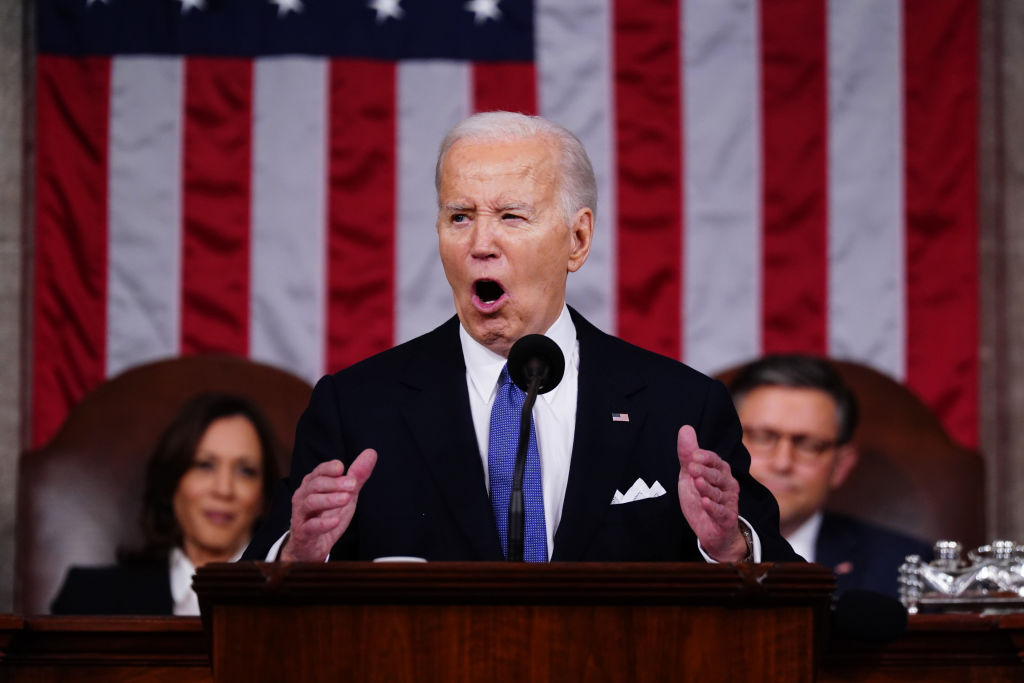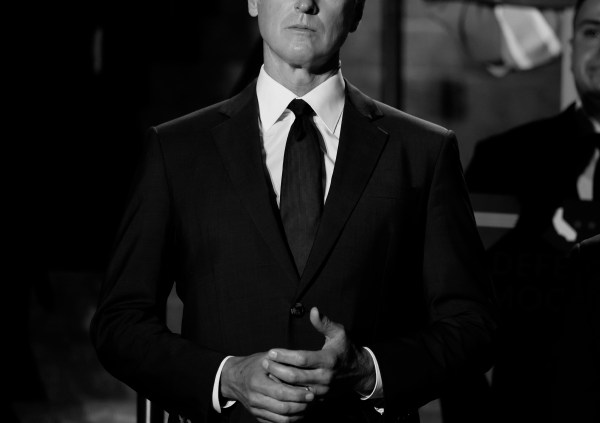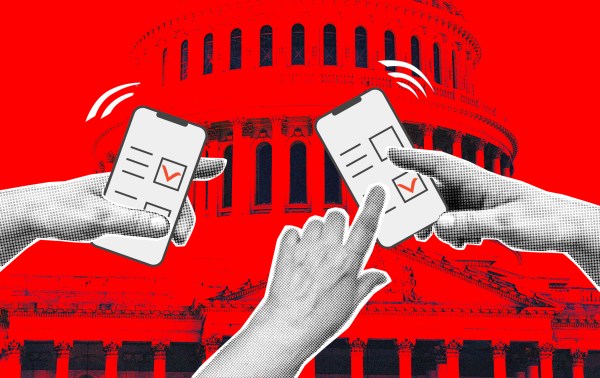Dear Reader (Even any of you who took part in the Florida Man Games),
So I have precisely 98 minutes to write this. I have no topics in mind, so I’m going to cop out and write about the State of the Union address, even though I hate the State of the Union address. If you think that’s a waste of your time, I get it. I’ll talk to you next week. I won’t take offense.
Of course, sometimes it’s fun to put a clock on someone to do something pretty conventional. Give someone a box of Betty Crocker 12-minute brownie mix and ask them to bake some brownies. That’s not interesting. Ask them to make those 12-minute brownies in seven minutes and you’ve got something.
One of the problems with the written word is that it can’t convey tone as effectively as the spoken word. I’d like to write a G-File in the style of Sen. Katie Britt, but I don’t know how to do it. I mean, I could include bracketed directions like it was a movie script, but it wouldn’t be the same. [Cue barely controlled rage] Just like America won’t be the same because of Joe Biden’s refusal to provide real bracketed direction at the American border.
[Switch to moist-eyed sorrow] But the written word just doesn’t work that way [stifled sob].
So, I’ll just have to make do, pecking out word things.
I’ve written a lot about how I don’t like the State of the Union address. I’ve also written a lot about how I don’t like Woodrow Wilson. I bring him up because he’s the one we have to thank for the spectacle it’s become. In 1800, John Adams was the last president to give the address in person until Wilson brought the custom back 113 years later.
I don’t think it’s a coincidence. Adams had a paranoid and authoritarian streak. He used the Alien and Sedition Act to arrest critics of his administration. Wilson used the Sedition Act of 1918 to arrest his critics, too. Indeed, until Biden’s address, my main complaint against the SOTU was that it’s too monarchical. From the sergeant-at-arms’ introduction onward, the whole thing has a feeling of a monarch visiting Parliament to put it in its place. The fact that Congress must invite the president to appear gets lost because politics requires the invitation.
But it’s worth keeping in mind why that invitation is necessary: Congress is superior to the executive branch. It’s the first branch of government and it has—on paper—the most power. It is not “coequal.” Indeed, the whole idea of “coequal” branches is a fiction invented by the Nixon administration as a way to avoid being held accountable to Congress and the courts. Congress can fire members of the other branches. It sets their pay. It tells them what to do. That republican and democratic vision gets washed away by the spectacle of the State of the Union address.
Anyway, that was my primary objection. But it’s now been reduced to primarily a partisan infomercial. In some ways, it was inevitable. The State of the Union address is one of those civic institutions that commands attention. But because it commands attention in our modern attention economy, politicians cannot resist bending it to their partisan interests.
This has been going on for a while, but last night’s performance—by Biden, Democrats, and Republicans—crossed a Rubicon. This is a bipartisan failure. Ronald Reagan introduced the schtick of having human props in the gallery, a brilliant tactic used by presidents ever since. Another modern watershed moment was when Rep. Joe Wilson yelled “You lie!” at a joint session in 2009 (the first address of a president’s term is technically not a State of the Union address). Wilson raised his profile as well as tons of money and off his stunt, which tells you why Marjorie Taylor Greene and her ilk consider that kind of thing part of their business model. But Obama benefited from it too. Everyone is a Baptist and a bootlegger in modern American politics.
This is a good example of how changes in one part of our political system have consequences in unanticipated places. When parties had more control over their members, party leaders had tools to discipline such antics. But their purse strings were cut by campaign finance reform and changes in the media landscape made “going rogue” profitable for individual politicians.
I’ll skip how the primary system is a big part of the problem because you’ve heard me out on that plenty of times. But suffice it to say that when base voters and small donors are the only threats to incumbency, you create incentives to ignore rules of decorum and basic civics and civility.
That’s why Biden’s direct attack on the Supreme Court for overturning Roe v. Wade was so galling. Biden is correct to think he has a problem with his base. He might even have been shrewd in using the SOTU as an opportunity to shore up his problems with the base.
But that’s sort of my point. The political incentives are perverse everywhere you look. In an earlier era, a president would look for other opportunities to pander to the base rather than use the State of the Union address like it was a rally at SEIU headquarters. It’s a bit like Biden’s unprecedented decision to walk the picket line with UAW workers. Lots of presidents have wanted to curry favor with unions. But the president is supposed to at least nominally be neutral in labor disputes, not least because he appoints the members of the NLRB, which is supposed to be independent.
Anything that can be used for politics gets used for politics now. Recall Donald Trump used the White House as a de facto RNC nominating convention in 2020.
I have my doubts about the shrewdness of Biden’s decision to use the SOTU as a partisan platform. He may think that he can win the votes from the middle by painting Trump as too extreme. Lord knows Trump can be counted on to help with that messaging. And he may be right.
But that decision hinges on a bet about the electorate. Obama made the same bet and it worked for him in 2008 and 2012. The days of “pivoting” to the center may indeed be over. Just turn out the base and demonize your opponent to the point where the middle votes for the lesser of two evils. Trump world works on the same assumption, telling Haley voters and other getable voters they’re not welcome unless they convert wholeheartedly to MAGA. If they don’t convert, they’re the enemy now, too.
But Obama and Trump were different kinds of candidates. Obama had, and Trump has, diehard supporters and reserves of low-propensity voters to count on. Biden was supposed to be a reassuring middle-of-the-road guy. I know Biden has “superfans” but there aren’t many of them. His majority relied on two groups: 1) base voters who could hold their noses and vote for Biden if it meant ousting Trump. I think he will still mostly get them. 2) The “normals” who wanted … normalcy. Biden has steadfastly refused to govern as if he was worried about these voters. He simply takes them for granted. And by using the State of the Union the way he did he sends a signal that the normals still have no obvious home.
This was an understated point of my Wednesday G-File. There are a lot of voters out there who don’t want to live in a country where politics is constantly framed as an apocalyptic struggle between good and evil and where the stakes are the survival of the country. Biden is betting that he can win the majority of these voters by casting Trump as an existential threat to democracy and all that. I get the argument. But the risk in Biden’s approach is that people may conclude that fear-mongering hyper-partisanship is the new normal for both parties. If that’s the case, a lot of voters might simply choose Trump, for any number of reasons, including the fact that Trump is just better suited to be an abnormal president in abnormal times. Or they might just stay home, disgusted with the spectacle entirely.
Various & Sundry
Canine update: I’m very short on time. So I’ll be brief. I’m in Sea Island, Georgia, and the (canine) girls are staying at Kirsten’s. We are reliably informed that they are doing just fine, but Zoë refuses to pose for proof-of-life photos. Before I left, I got in some extra ball work with Pippa. They’re both quite pleased with warmer and wetter weather. I will try to get a good welcoming committee video upon my return. And, done, with 12 minutes to spare.
ICYMI
And now, the weird stuff







Please note that we at The Dispatch hold ourselves, our work, and our commenters to a higher standard than other places on the internet. We welcome comments that foster genuine debate or discussion—including comments critical of us or our work—but responses that include ad hominem attacks on fellow Dispatch members or are intended to stoke fear and anger may be moderated.
With your membership, you only have the ability to comment on The Morning Dispatch articles. Consider upgrading to join the conversation everywhere.